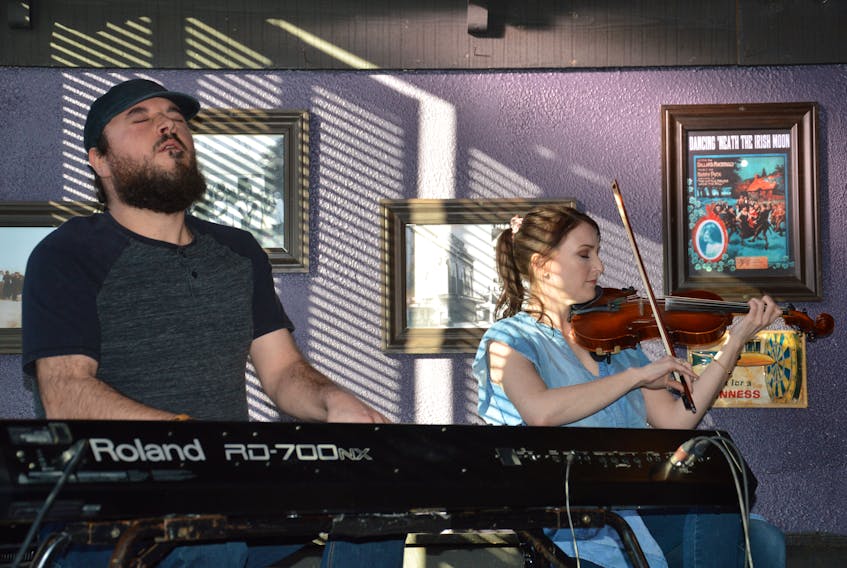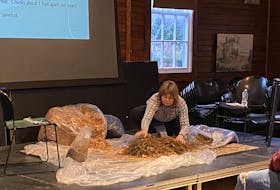SYDNEY, N.S. — With the East Coast Music Awards slated to return to Cape Breton later this year, expectations had been high that a dream project of turning this area into an international music haven had been making some progress.
After all, with culture, music and talented people galore, Cape Breton seemed like a natural choice to become the world’s latest music city.
And then along came COVID-19.
While the idea remains, it’s now just that — a great idea, but one whose time has not yet come.
“It’s basically on hold for now,” said Duane Nardocchio, operations manager for the Cape Breton Music Industry Cooperative or CBMic.
“It’s a 10-year build and it’s definitely still on the radar but everything is on hold.”
At the last ECMAs held in Sydney in 2016, the report, Striking A New A-Chord, was commissioned by the ECMAs and Music Canada Live. It was released the following year in Saint John, N.B.
INTRIGUING IDEA
The report called for the need to develop an Atlantic Canadian music strategy to strengthen the future of this region’s music and it emphasized that investment in the music industry would be beneficial not only for musicians but for the region in general.
It also called for the development of an Atlantic Canadian Music Fund that would provide resources to complement existing programs, attract investment and develop and encourage musicians and music-related businesses to reinvest in the region. The idea intrigued Nardocchio and other Cape Bretoners involved in the music industry.
“So we started to look into the research on it and talked back and forth with various people involved in those organizations just to get a feel on what it is,” said Nardocchio.
“It’s a very large and detailed project and basically it can go as far as you want it to go. It can be as complicated or as uncomplicated as you want it to be, depending on what you are trying to achieve.”

MUSIC TOURISM
Music cities exist around the world and include such places as Nashville, New Orleans or Austin, places identified as being hubs for musicians or particular styles of music.
Because of the association, they become magnets for tourism. Since Sydney is a relatively small place, the idea was to market Cape Breton as a music centre.
“We have a strong community of communities around this island and we’re very strong in music culture, we have a long history in it and we have various cultures with Indigenous, the Scottish settlers, some Irish people, French Acadians and just in general, we have an unspeakable amount of musicians all across the island,” said Nardocchio.
“Not only musicians but very talented musicians and many have made inroads all around the world. All of that coming from this small island … maybe it was time that we really capitalized on this and learned to get all our communities together and be proud of what we have. Work together and really build something towards music tourism and that was sort of the start of it all.”
SEEKING PARTNERSHIPS
Nardocchio and others began looking at the industry’s assets and infrastructure that existed and what would be needed.
“It soon became evident that we had a lot to work with and it would just be a bit of a project to just start working together and reach out to all the communities and see if we could get everybody involved on a level where everybody is a bit of a stakeholder — so that was the initial phase,” said Nardocchio.
“And then, we were contacted by Destination Cape Breton who basically were working around a concept of music tourism for the next 10 years plus as their next move. So they asked if we had ever heard about all this Music Island City stuff and we said almost two years now we’ve been working on this.
"We were pleased to hear that and we decided that we would set up a bit of a partnership and started looking at it together.”
Discussions began in earnest and while no funding had been forthcoming, 2020 was supposed to have been a pivotal year in bringing the idea to the surface.
“We tried to align it a little bit with the whole cultural economy sort of movement that was happening around Cape Breton — other arts/culture groups were also looking at it,” said Nardocchio.
PANDEMIC IMPACT
He said 2020 was initially being aligned to be the year of music and to launch the concept of music island and the music tourism idea from Destination Cape Breton.
"What would have happened was in November of 2020, we would have had Nova Scotia Music Week, we would have had Celtic Colours, and then we would have had a big music conference right in between and then we would have been leading into the ECMA coming in May 2021 and then starting to partner with other events and so on.
"But as you know Music Nova Scotia Week was cancelled, ECMA 2020 got cancelled and the big music conference that we had worked on was cancelled and there was a variety of other things.
“We all went from being excited and being in the planning mode to everybody’s focus shifting to survival mode.”
In the past year, musicians have seen most of their sources of work disappear and for most, 2021 isn’t looking much better.
“We’re trying to navigate a course because it looks like we’re going to be well into 2021 before we see any major changes where we can get back to major events but then, what does “major” look like moving forward? Is major up to 400 people, are we ever getting back to the thousands of people?” he asks, wondering if there will even be funding in the future for such projects.
But while it may be on the back burner for now, Nardocchio hasn’t given up on it.
“So our vision remains the same but I think maybe what we will do we will have to look at it again through the lens of maybe a slower start than what we had hope for.”
Elizabeth Patterson is a culture and health reporter at the Cape Breton Post.









